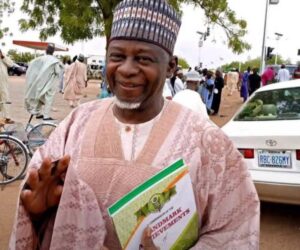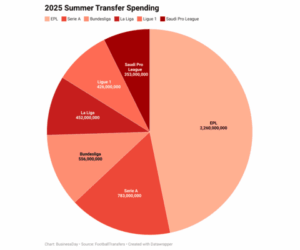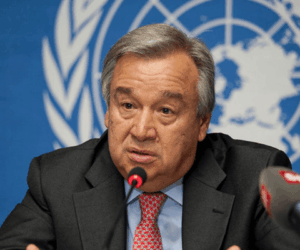ADULTS AS CHILDREN GOVERNORS/LEADERS
Social media erupted with anger over the actions of state governors who lined up to salute President Bola Tinubu as he embarked on his latest holiday.
There were opinion pieces, cartoons and emojis—some of the articles named and shamed particular governors.
Here is a sample.
When we were in primary school many decades ago, we used to line up to welcome government visitors. We sang welcome songs for them and waved goodbye as they left. Then there were fewer aircraft. They travelled in cars.
Many years later, and in the year of Our Lord 2025, grown men who are Governors of their States and leaders of lawmaking bodies still line up like we did many decades ago, to wave at a departing aeroplane carrying President Bola Tinubu on “a 10-day working visit to the UK and France.”
These people travelled many kilometres from their states to shake hands with the travelling president, wave goodbye as he departs, frolic a bit in Abuja, and then fly back to their respective states to be welcomed by their own retinue of aides, who will also wave as their chartered private jets land — that is, for those returning. Some govern from Abuja.
All these are at the expense of taxpayers’ money, their respective governments’ money, and the people’s money.
Meanwhile, the roads in their states are full of craters and potholes. Criminals are running riot. Social miscreants are in control. The people are bleeding. A few are enjoying and waving, too.
Now, I am incurably pessimistic that the Blackman is incapable of sustaining civilisation. In that case, some will come here and start pontificating how Egypt was the cradle of civilisation, as if Egypt were a black nation.
What we did many decades ago as children has been replicated by adults, our leaders who were then adjudged to be leaders of tomorrow.
That tomorrow came, and those children became leaders as adults and then children again.
Shame!
-Facebook.

https://x.com/NigeriaStories/status/1962960362136879257?t=FvWKsveLJ_kj752K3wY-Bg&s=08
https://x.com/NigeriaStories/status/1962960362
The Enugu-Sujimoto Smart Schools Scandal: A Comprehensive Analysis of the Outrage
Barely two weeks after the successful Bar conference Enugu 2025, which earned praise for Enugu State, a major scandal involving a contract and the misuse of public funds has dragged the state into various problematic directions. None of it is beneficial or fitting for its reputation.
The response has been passionate and polarised.
The controversy surrounding the Enugu State Smart Schools project and the involvement of Sujimoto Luxury Construction Limited has sparked widespread public outrage, allegations of fraud, and a broader debate about governance, accountability, and the implementation of public contracts in Nigeria.
1. Background of the Smart Schools Project
• Project Scope: The Enugu State Government, under the leadership of Governor Peter Mbah, launched an ambitious initiative to construct 220 Smart Green Schools, aiming to enhance educational infrastructure and digital learning in the state.
• Contract Award: On 2 July 2024, the government awarded a contract worth ₦11.46 billion to Sujimoto Luxury Construction Limited for the construction of 22 Smart Schools (buildings only), with a six-month completion timeframe.
• Advance Payment: The state government paid ₦5.76 billion (50% of the contract sum) upfront to accelerate the projects, aiming for completion by September 2025, ahead of the new school session
2. Allegations of Fraud and Abandonment
• Abandoned Projects: The Enugu State Government accused Sujimoto’s CEO, Olasijibomi Ogundele, of abandoning the projects after receiving the advance payment. A joint inspection by the state Ministry of Works and the EFCC in May 2025 revealed minimal to no significant work at the 22 sites, with some sites lacking even basic excavation.
• Shoddy work and inexperienced workers: The government claimed that Ogundele employed unqualified engineers and inexperienced staff, leading to substandard work that did not meet structural standards.
• Premeditated Fraud: The government alleged that Ogundele presented a bond from Jaiz Bank to secure the contract but received payments through a Zenith Bank account, making it impossible to hold Jaiz Bank liable. This was described as a “premeditated intent to defraud the state.”
• EFCC Involvement: The Economic and Financial Crimes Commission (EFCC) declared Ogundele wanted for alleged diversion of funds and money laundering.

3. Sujimoto’s Defence and Public Reaction
• Ogundele’s Response: In an emotional video, Ogundele denied the allegations, stating, “I am not a thief, I am not a fugitive.” He attributed the project’s failure to inflation (such as rising cement costs), security challenges (such as attacks on workers), and the additional demands of the state government, including its proposal to build “a city and the tallest building in Nigeria.”
• Public Outrage: The scandal triggered widespread criticism from citizens, who questioned the transparency of the contract award process and the qualifications of Sujimoto for such a project. Many argued that local contractors could have executed the projects more efficiently.
• Ethnic Dimensions: Some commentators, like @Otunba Balogun, injected ethnic bias into the debate, warning Yoruba businessmen against partnering with Igbo clients. This was widely condemned as divisive and unproductive.
• Calls for accountability: citizens demanded investigations not only into Sujimoto but also into government officials who approved the contract, alleging possible kickbacks and favouritism.
4. Financial and Governance Implications
• Cost Concerns: At ₦500 million per school, critics argued that the project was overpriced and that the funds could have been used to renovate multiple existing schools.
• Governance Questions: The scandal raised broader concerns about due process in awarding contracts. Critics recalled the higher governance standards set by former Governor Sullivan Chime and questioned why Governor Mbah engaged an external developer with limited experience in educational infrastructure.
• Reassignment of Projects: The state government has since reassigned the projects to new contractors and pledged to complete them by September 2025.
Broader Impact and Lessons
• Reputational Damage: The scandal has damaged the reputation of both Sujimoto, known for luxury real estate projects in Lagos, and the Enugu State Government, which campaigned on a platform of reform and transparency.
• Business Lessons: The case highlights the risks for entrepreneurs engaging in government contracts, including financial mismanagement, inflationary pressures, and political interference.
• Socio-Economic Impact: The abandonment of the projects directly affects thousands of students in Enugu, who may lack adequate facilities for the new academic session. This underscores the need for stricter oversight of public projects.
Conclusion
The Enugu-Sujimoto scandal is more than a contractual dispute; it reflects deeper issues of accountability, governance, and public trust in Nigeria.
While the EFCC’s investigation may provide some clarity, the outrage underscores the need for:
1. Transparency in awarding public contracts.
2. Due diligence in selecting contractors.
3. Stronger oversight to prevent fraud and ensure project completion.
As the situation evolves, citizens continue to demand justice and accountability from both the contractor and the government officials involved.

Lingering questions on Enugu versus Sujimoto
All that is clear with this matter is that, after all the hype, Peter Mbah’s team lacks a strong governance structure on the use of public finance.
For crying out loud, the Sojimoto CEO didn’t wander into the state’s treasury’s secure area and take away the #5.7b without local accomplices.
Firstly, who authorised the waiver for the payment of the contract funds to Zenith Bank instead of Jaiz Bank, which issued the Performance Bond for the project? That singular act paved the way for this monumental fraud.
For a project so important to the governor, why were no robust measures established from the contract award, funds disbursement, and project monitoring?
The upfront payment of such a substantial fund to a company that has not previously managed and completed a significant project for the state raises concerns about project management.
Why was the payment system based on certification abandoned in this case? It would have avoided all this fuss in the public eye.
Now, there’s an issue of discrepancy between the amount the contractor claimed to have received and what the state said they had disbursed. The contractor claims he received #5.2b, whilst the state claims it has disbursed ₦5.7b.
I’d like to know whether the government carried out any due diligence before awarding the contract. Why did the contractor leave the site with only minimal work done?
Was there no room for variations in cost where a justifiable claim is made?
Citizen JE on Facebook.









